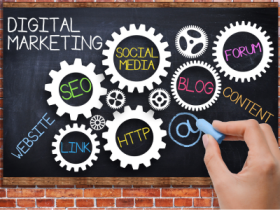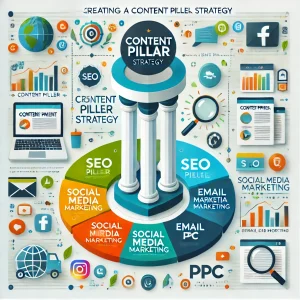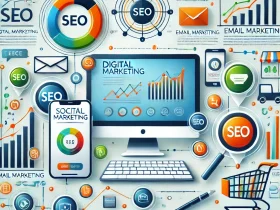The digital marketing landscape is constantly evolving, with new trends emerging every year. In today’s fast-paced environment, it’s crucial for businesses to stay ahead of the curve and adapt to these changes. In this article, we will explore the key trends that are currently shaping the future of digital marketing and how businesses can leverage them to stay competitive.
1. Artificial Intelligence and Machine Learning in Digital Marketing
Digital marketing is greatly benefiting from artificial intelligence (AI) and machine learning (ML). These technologies are transforming the way businesses approach customer engagement. AI helps companies automate tasks, predict customer behavior, and create personalized marketing experiences. For example, AI-powered chatbots in digital marketing provide 24/7 customer support, answering queries in real time and enhancing the customer experience.
How AI is Impacting Digital Marketing
| Impact Area | AI in Digital Marketing |
|---|---|
| Personalization | AI helps businesses create hyper-personalized content and recommendations based on individual user behavior in digital marketing. |
| Predictive Analytics | With digital marketing, businesses can use predictive analytics to understand and anticipate customer preferences, tailoring campaigns effectively. |
| Automation | Marketing automation tools powered by AI are streamlining digital marketing tasks such as email campaigns and social media scheduling. |
2. Voice Search Optimization for Digital Marketing
With the rise of voice-activated assistants like Amazon Alexa, Google Assistant, and Apple Siri, voice search is now an essential part of digital marketing strategies. Consumers are using voice commands to search for products and services, making it vital for businesses to optimize their content for voice search.
Why Voice Search is Important for Digital Marketing
- Local SEO: Voice search queries often include local intent, making it essential for digital marketing professionals to optimize their Google My Business listings and local SEO efforts.
- Natural Language Processing: Voice searches are more conversational, meaning marketers need to focus on long-tail keywords and natural language for digital marketing content.
3. Video Marketing and its Role in Digital Marketing
Digital marketing continues to benefit from the increasing popularity of video content. Platforms like YouTube, TikTok, and Instagram Reels have made video marketing a top priority for brands. Video content is highly engaging and is proving to be one of the most effective ways to capture the audience’s attention.
Video Marketing Trends to Watch in Digital Marketing
| Trend | Description |
|---|---|
| Live Streaming | Live video on social media platforms is growing, and businesses are leveraging digital marketing to interact with customers in real time. |
| Short-Form Videos | Platforms like TikTok and Instagram have popularized short-form video content, allowing businesses to engage younger audiences in digital marketing. |
| Interactive Videos | Interactive video content, such as clickable videos or choose-your-own-adventure style, is becoming a more engaging tool in digital marketing. |
4. Influencer Marketing in Digital Marketing
Influencer marketing has grown significantly in digital marketing. By collaborating with influencers, businesses can extend their reach and build trust with their target audience. The key to success in influencer marketing lies in selecting the right influencers and maintaining long-term partnerships.
Best Practices for Influencer Marketing in Digital Marketing
- Micro-Influencers: Many brands are choosing to work with micro-influencers in digital marketing, whose smaller but highly engaged audiences provide better conversion rates.
- Long-Term Partnerships: Businesses that develop ongoing partnerships with influencers can build more authentic relationships and improve the impact of their digital marketing strategies.
5. Augmented Reality (AR) and Virtual Reality (VR) in Digital Marketing
Augmented reality (AR) and virtual reality (VR) are becoming increasingly popular in digital marketing, offering immersive experiences for consumers. These technologies allow brands to create unique, engaging experiences that allow customers to interact with products in new and innovative ways.
How AR and VR are Transforming Digital Marketing
| Technology | Impact on Digital Marketing |
|---|---|
| Product Visualization | In industries like retail and real estate, AR and VR are being used to allow consumers to visualize products and services before making a purchase, revolutionizing digital marketing. |
| Interactive Ads | Brands are using AR and VR in digital marketing to create interactive advertisements that let consumers engage with products in 3D or experience them virtually. |
6. Social Commerce: A New Trend in Digital Marketing
Social media platforms like Instagram, Facebook, and Pinterest are integrating e-commerce features, allowing users to shop directly from the platform. Social commerce is becoming an essential element in digital marketing, allowing businesses to convert social media engagement into sales.
Social Commerce in Digital Marketing
- Seamless Shopping: Consumers now enjoy a seamless shopping experience within digital marketing platforms, allowing them to discover and purchase products without leaving their social media apps.
- Shoppable Posts: Businesses can now tag products in their social media posts, making it easier for consumers to make purchases through digital marketing.
7. Data Privacy and Security in Digital Marketing
As concerns about data privacy grow, digital marketing practices must prioritize secure collection, storage, and use of customer data. With stricter regulations such as GDPR and CCPA, businesses are being forced to implement more transparent and secure data practices.
What Digital Marketing Needs to Do
- Transparency: Businesses need to be clear about how customer data will be used in digital marketing, and give users control over their information.
- Security Measures: Digital marketing must invest in secure platforms to protect customer data from breaches and misuse.
8. Sustainability and Social Responsibility in Digital Marketing
Consumers are more concerned about the environmental and social impact of the brands they engage with. Businesses that incorporate sustainability and social responsibility into their digital marketing efforts are seeing positive responses from consumers, as they align their actions with values that matter to their customers.
How Sustainability is Shaping Digital Marketing
- Eco-Friendly Products: In digital marketing, businesses that promote environmentally friendly products and services are tapping into the growing market of eco-conscious consumers.
- Cause-Driven Campaigns: Aligning brands with social causes through digital marketing fosters brand loyalty and attracts consumers who share similar values.
Conclusion
The future of digital marketing is bright, and staying on top of emerging trends is crucial for businesses to remain competitive. From AI and voice search to video marketing and influencer partnerships, digital marketing is evolving rapidly. Businesses that embrace these changes and adapt their strategies will be best positioned to succeed in the ever-changing digital landscape.
Explore more about Digital Marketing’s Importance for further insights on how it can transform your business. For a deeper understanding of digital marketing strategies, check out this article on MarketingWay’s Transformation.






Leave a Reply